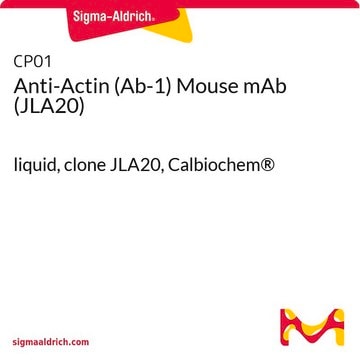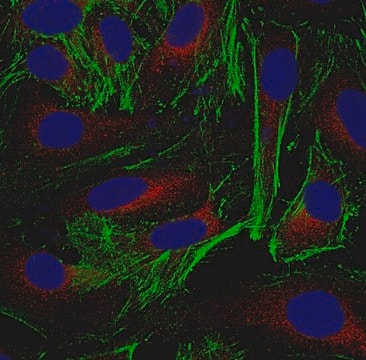MABT219
Anti-Actin Antibody, clone JLA20
clone JLA20, from mouse
Synonym(s):
Actin, alpha skeletal muscle, Alpha-actin-1
About This Item
Recommended Products
biological source
mouse
Quality Level
antibody form
purified immunoglobulin
antibody product type
primary antibodies
clone
JLA20, monoclonal
species reactivity
human
species reactivity (predicted by homology)
chicken (immunogen homology)
technique(s)
immunofluorescence: suitable
western blot: suitable
isotype
IgMκ
NCBI accession no.
UniProt accession no.
shipped in
wet ice
target post-translational modification
unmodified
Gene Information
human ... ACTA1(58)
General description
Application
Western Blot Analysis: A representative lot was used by an independent laboratory in Me4405 melanoma cell lysate. (Thomas, W.D., et al. (2000). Journal of Immunology. 165:5612–5620.)
Quality
Western Blot Analysis: A 1:1,000 dilution of this antibody detected Actin on 10 µg of SK-BR3 cell lysate.
Target description
Linkage
Physical form
Analysis Note
SK-BR3 cell lysate
Other Notes
Not finding the right product?
Try our Product Selector Tool.
recommended
Storage Class Code
10 - Combustible liquids
WGK
WGK 2
Flash Point(F)
Not applicable
Flash Point(C)
Not applicable
Certificates of Analysis (COA)
Search for Certificates of Analysis (COA) by entering the products Lot/Batch Number. Lot and Batch Numbers can be found on a product’s label following the words ‘Lot’ or ‘Batch’.
Already Own This Product?
Find documentation for the products that you have recently purchased in the Document Library.
Our team of scientists has experience in all areas of research including Life Science, Material Science, Chemical Synthesis, Chromatography, Analytical and many others.
Contact Technical Service






